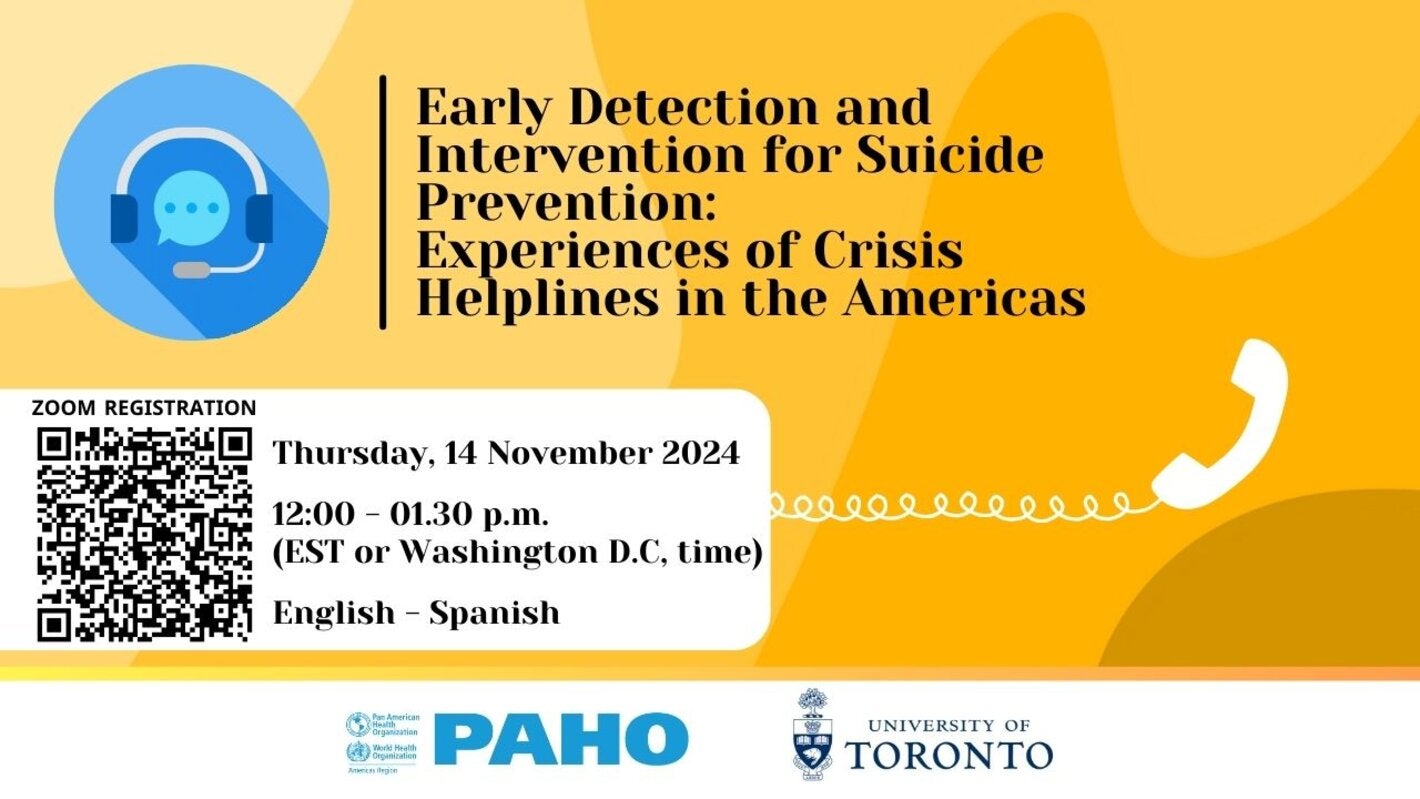
The Pan American Health Organization (PAHO) and the University of Toronto cordially invite you to attend the webinar ¨Early Detection and Intervention for Suicide Prevention: Experiences of Crisis Helplines in the Americas", which will take place on Thursday, 14 November, at 12:00 p.m. (EST or Washington D.C. time). This session will explore the role of crisis helplines in preventing suicide in the Region. It will present different countries’ experiences in developing, implementing, and maintaining crisis helplines, highlighting challenges, lessons learned, and opportunities for the future.
HOW TO PARTICIPATE
- DATE: Thursday, 14 November 2024
- TIME: 12.00 P.M. (Washington D.C. or EST) [Check the time in other cities at the bottom of this page]
- LANGUAGES: Spanish and English, with simultaneous translation in both languages.
- REGISTRATION: https://paho-org.zoom.us/webinar/register/WN_YlRBigMnR4yM9JN3lyj4Ow#/registration
AGENDA
- 12:00 pm-12:05 pm - Introductory remarks
- Dr. Mark Sinyor. Associate Professor of Psychiatry, University of Toronto
- 12:05 pm-12:25 pm - The 988 Crisis Helpline in the United States: Development and Lessons Learned
- Dr. Richard McKeon, Senior Advisor in the 988 and Behavioral Health Crisis Office, Substance Abuse and Mental Health Services Administration (SAMHSA), United States
- 12:25 pm-12:45 pm - 988 in Canada: A Year of Application Experiences
- Dr. Allison Crawford 988 Chief Medical Officer, The Centre for Addiction and Mental Health (CAMH), Canada
- 12:45 pm-1:05 pm - Speaking the Same Language of Prevention: Overview of Crisis Helplines in Costa Rica
- Dr. Elizabeth Seaward, Clinical Psychologist, Costa Rica
- 1:05 pm-1:25 pm - Questions and answers
- 1:25 pm-1:30 pm - Closing remarks
- Dr. Renato Oliveira e Souza. Chief, Mental Health and Substance Use Unit, Pan American Health Organization
CONTEXT
Each year, nearly 100,000 people die by suicide in the Americas, and for every suicide, it is estimated that there are at least 20 suicide attempts. Between 2000 and 2019, the suicide rate in the Region increased by 17% percent, with the Americas being the only WHO Region to show an increase during this period.
Although countries in the Americas have made progress in suicide prevention, many continue to have high or increasing suicide rates. They are not on track to reach the Sustainable Development Goal Target 3.4: “to reduce by one-third premature mortality from non-communicable diseases through prevention and treatment and promote mental health and well-being.”
Major barriers to preventing suicide in the Region include weak suicide surveillance systems, a lack of evidence-based national suicide prevention strategies, low mental health service coverage, insufficient multisectoral collaboration, and stigma and discrimination associated with mental health conditions and suicide.
The Pan American Health Organization's Mental Health and Substance Unit has partnered with the University of Toronto to deliver a series of four webinars on suicide prevention in the Americas region during 2024 and 2025. The first webinar, “Working Together to Prevent Suicide in the Americas, Changing the Narrative,” was held on 10 September 2024 to commemorate World Suicide Prevention Day.
RELATED LINKS
Campaign: World Suicide Prevention Day 2024
Suicide prevention (PAHO´s webpage)
TIME IN OTHER CITIES
- 9:00 a.m. – Los Angeles, Vancouver.
- 11:00 a.m. - Belmopan, Guatemala City, Managua, Mexico City, San Jose (CR), San Salvador, Tegucigalpa,
- 12:00 p.m. – Bogota, Kingston, Lima, Panama City, Quito, Washington D.C., Georgetown, Havana, Port-au-Prince, Nassau, Ottawa.
- 1:00 p.m. - Bridgetown, Caracas, La Paz, Santo Domingo, Port of Spain, San Juan.
- 2:00 p.m. – Asunción, Santiago, Buenos Aires, Brasilia, Montevideo, Paramaribo.
- 6:00 p.m. – Geneva, Madrid.
For other cities, check the local time using the following link.
